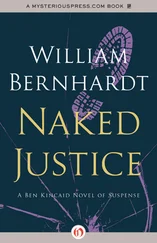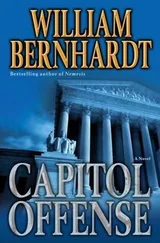Was that a challenge, Doctor? “My point is that you don’t know exactly what Johnny did. The killing stroke-to use your own words-could have come from another person.”
Wilson shook her head. “Even if it was his fraternity friend-”
“But what if it was another person altogether? A third person.”
“I’ve heard no evidence of a third person.”
“But you can’t rule out the possibility.”
“When we have two self-confessed perpetrators who conducted an extensive torture and beating, it seems absurd-”
“Dr. Wilson, could Tony Barovick have been strangled?”
Christina’s sudden switch threw the coroner off balance. “Uh-strangled?”
“Sure. You said he died of oxygen deprivation to the brain. You hypothesized that a jaw or neck injury might’ve caused asphyxiation. Wouldn’t a simpler explanation be that someone strangled him?”
Wilson hesitated. “I haven’t heard anything about any strangling…”
“And that’s the problem, isn’t it? You don’t want to attribute the death to strangulation-because Johnny never confessed to any strangling. You want to attribute death to one of the things he did confess to. But that doesn’t make it the cause of death. Especially if a third person was involved.”
Wilson was beginning to squirm. “I think it’s pointless to speculate when we know the victim endured a hideous assault.”
“You’ve read the transcript of Johnny Christensen’s so-called confession, haven’t you?”
“Of course.”
“So let me ask you, Doctor-is it possible that a person could have endured all that Johnny described and still live?”
“Oh, anything’s possible, but-”
“In fact, judging from Johnny’s description, the beating-although horrible, to be sure-did not involve anything that would absolutely, positively cause death, right?”
“I assume the defendant downplayed the intensity-”
“Well, now assume he told the absolute to-the-letter truth. Despite the severity of the injuries, those wounds were not necessarily fatal, right?”
“I agree that survival was possible. But given that he didn’t-survive, that is-and that we know this horrible assault occurred, to speculate about third parties and intervening causes is just indulging in fantasy.”
“Were there contusions on Tony Barovick’s neck?”
Again, the switch caught her flat-footed-which, of course, was exactly what Christina wanted. “It’s true, there were abrasions on the anterior neck, but-”
“And streaking arethema on the lateral aspect of zone one?”
Wilson did a double take. “Ye-esss…”
“And the cartilaginous tracheal rings were crushed?”
Wilson sighed. “Been doing some reading, Ms. McCall?”
“I try to stay informed. All of those factors are possible indicators of strangulation, aren’t they?”
“True. But just the same,” Wilson continued, “with a body so severely tortured and mutilated, those injuries could have been caused by any number of things.”
“Including strangulation by a third person?”
Wilson’s frustration was mounting. “This whole speculation about a third person is useless.”
“Useless to the prosecution, yes. You don’t want to suggest strangulation as a possible cause of death, because in his confession Johnny didn’t say anything about strangulation. You want to pin it on something he confessed to doing.”
“No, that isn’t-”
“Nonetheless, simple strangulation, subsequent in time to the beating, is a possible cause of death. Correct?”
Wilson took a deep breath. “As I testified, the time of death was shortly before the body was found. There wasn’t time-”
“Well, let’s talk about that,” Christina said, flipping a page in her notebook. “You say the time of death was about 11:15-and in no case earlier than 11:00.”
“That’s correct.”
“And you base this conclusion on the body’s decomposition, which you tell us is steady and predictable.”
“Absolutely.”
Christina snapped her fingers. “Come to think of it, what you actually said was that absent extraordinary circumstances , the rate was steady and predictable. What would some of those extraordinary circumstances be, Doctor?”
“They are all wildly improbable.”
“Try me.”
“If the body was exposed to radiation-which it wasn’t. If he’d been feverish at the time of death-which he wasn’t.”
“What about if he’d been refrigerated?”
“Excuse me?”
“Refrigerated. What if?”
“But the body wasn’t refrigerated. It was found in a fraternity house.”
“Was it terribly cold in that fraternity house?”
She looked at Christina as if she’d asked to see her knickers. “Not that I recall.”
“Think harder, Doctor. When I visited your office last week, you mentioned that the room was cold. And Officer Montgomery told us it was so chilly he sent his partner after his coat.”
“If you say so.”
“But it was you who said so, Dr. Wilson. And you were right. Do you know how cold it was? When the doors and windows in the room were shut? Before the police arrived?”
“I couldn’t possibly know. No one could.”
“Well, actually, Doctor-I could.” From the defendant’s table, Vicki passed her a photo that had already been admitted into evidence. “The crime scene technicians photographed and videotaped the entire room where the body was found-including the north wall, which is where the thermostat is located. I took the liberty of having that section of the photo enlarged.” She slid it across the witness stand. “Let me ask you again, Doctor-what was the temperature in that room?”
Wilson frowned. “Sixty degrees.”
“Sixty? Now that’s pretty cold, especially in a small room with all the doors and windows shut. Wouldn’t have taken long to cool to that temperature.”
Wilson tossed down the photo. “I will admit that it is an abnormally low temperature, but it’s hardly a refrigerator.”
“So how much effect do you think that low a temperature would have on the body’s decomposition?”
“I couldn’t say exactly. Not much.”
“I might have to argue with you there, Doctor.” Vicki passed Christina a large and heavy leather-bound book. “This is called Principles of Forensic Science and Criminology and was written by the late Dr. T. S. Koregai. It’s generally considered one of the definitive works on the subject. In fact, I think you have one in your office, don’t you, Doctor?”
“You know I do.”
“Dr. Koregai provides a chart in which he sets down the effect of increasingly low temperatures on postmortem decomposition. According to him, if the temperature is sixty degrees, you can expect decomposition-get this-to happen a third as fast as normal. He says the entire process would be slowed.” She pondered a moment. “You know, I’m no math whiz, but I think that means that instead of the time of death being an hour before you arrived, it was more like 9:30 or 10:00-when Johnny Christensen was in the company of several friends.”
“I suppose it’s theoretically possible-”
“Thank you, Doctor. No more questions.”
There was quite a stir in the courtroom after she finished. Half the reporters in the gallery ran out the back doors clutching their cell phones; the others were scribbling furiously in their notebooks. They seemed to think this was a breakthrough. And it had been a good cross-if she did say so herself.
But Christina didn’t kid herself. She might have established that Johnny could be telling the truth-but not that he was telling the truth. Unless she could come up with an explanation of who killed Tony Barovick and why, it was all too likely that the jury would conclude that the beating Johnny admitted to caused the death. Or that anyone capable of doing such a horrible thing to another human being deserved to die whether he delivered the killing stroke or not.
Читать дальше









